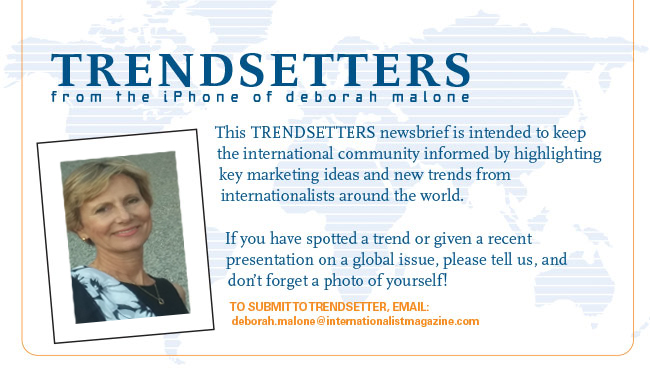

Debra Giampoli
See the current issue
of The Internationalist magazine
Find out how to sponsor an issue of Trendsetters
|
|
Trendsetters: Mondeléz' Debra Giampoli Shares New Trends in Client-Agency Partnerships
Debra Giampoli often refers to the wisdom of Einstein when describing the current challenges in client-agency relations: "We cannot solve our problems with the same thinking used when we created them."
As Director of Global Strategic Agency Relations at Mondeléz International, she began her career on the agency side of the business. Since that time, Debra Giampoli has spent more than 20 years on the client side in brand management, marketing services and advertising roles within Kraft Foods, and now Mondeléz. During the last eight years, she's helped brand teams around the world build relationships with agencies and other external marketing services partners. Her strategies, experimentations and discoveries have contributed to a significant shift within Mondeléz —not only in terms of how the company now selects its marketing partners, but also how Mondeléz encourages the best possible work from a multiplicity of sources.
Speaking earlier this month at the ANA's Advertising Financial Management Conference, she admitted that the traditional client-agency model was designed for a world that no longer exists. "The old adage of speed, quality and cost doesn't work anymore." While agencies grapple with strained profit margins, fee budgets that must stretch further than ever before, and the difficulties of attracting and retaining talent, they are also tasked to help their clients with far more complex problems. Debra Giampoli acknowledges that if marketers want different results, they have to do their part in leading change. Fortunately, she has shown that success is possible when both sides embrace more fluidity as they accept the need to transform.
Mondeléz has been experimenting with a number of new approaches to working with agencies, including: Project Meteor- a focus on smaller brands through an accelerated 10-week timeline that stresses creativity; Project Sprout- an emphasis on global brands and their cultural implications by working with multiple agencies at once, while using small teams and linking advertising to short-term sales results; Fly Garage—a new approach to innovation which began in Buenos Aires and brought together diverse talent to strategy sessions.
These experiments have laid the groundwork for a new way of working now in process, called Fly Fearless. According to Ms. Giampoli, "Fly Fearless leaps over existing models of engagement for regional brands, which are often an agency pain point for our regional managers. These brands are important to us, but they typically receive less attention than megabrands. As a result, they generally grow more slowly. Yet, their geography makes it easier to put our arms around a project, while they are meaty-enough brands to provide valuable insights."
She emphasizes that Fly Fearless is a mindset or a way of collaborating that checks egos at the door, and is as much about the individuals on the team as it is about the partner agencies involved. These 20-week projects have not only broken down silos, but saved money by focusing on specific work. According to Debra Giampoli, Fly Fearless has even helped its participants "fall in love with marketing all over again."
The Fly Fearless process is a streamlined, four-step program that involves defining the challenge, co-creation, acceleration, and activation and measurement. Throughout all four of these stages, there is tremendous curation, agitation and iteration that evolves from a commitment to a hand-picked team, their ideas and a collaborative work ethos. Debra Giampoli admits that the process may at times be "messy, but it pushes through to new innovations that are often scalable."
She describes the "flight crew" as having five critical roles:
- "The Trio" comprised of a senior brand manager, a senior strategist (from either the client or agency side), and a creative leader. These three individuals oversee the process and provide feedback.
- "The Stakeholder" who is the only person in the group that can approve the entire process.
- "The Fearless Flyers" defined as a tightly-knit team of roughly 10 individuals, selected by The Trio, to move the project forward and lead any necessary specialists.
- "The Facilitator" who not only monitors the project and keeps it on track, but who also has no stake in the outcome.
- "The Agitators" who are defined as external guests—authors, researchers, artists—that bring new thinking and diverse perspectives to stimulate ideas for the project.
Debra Giampoli also characterizes Fly Fearless as a teams of diverse talent working in hyper-collaboration with a compressed timeline to provide faster decision-making, which should result in better work with an improved ROI. After working on five pilots among the thousands of Mondeléz brands, she sees this as just a beginning.
However, she is also keen to quote famed cultural anthropologist Margaret Mead when underscoring the potential of Fly Fearless and its new method of building better client-agency partnerships: "Never doubt that a small group of thoughtful, committed citizens can change the world. Indeed, it is the only thing that ever has."
